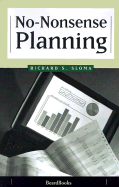|
|
|
|
||||||

|
No-Nonsense Planning
By Richard S. Sloma 
2000/01 - Beard Books 1893122638 - Paperback - Reprint - 188 pp. US$34.95 This effective book emphasizes the importance of timely and practical planning as a tool for making money and never as an end in itself. Publisher Comments
This easily readable handbook provides insights into the mentality required for effective, successful business planning through realistic, readily adaptable maxims. In 20 concise, brisk chapters Sloma describes the most powerful principles of dynamic planning with specific planning steps whether starting up a new business, introducing a new product, or "selling" an idea up the chain of command. No book review available RICHARD S. SLOMA is an attorney and internationally acclaimed lecturer. Twenty-eight years of hands-on management experience as a Board Member, Chairman, CEO and COO of several companies. Hold a J.D. from DePaul University and an MBA from the University of Chicago. He is the author of a number of other books on good business practices: No-Nonsense Management, No-Nonsense Planning, How to Measure Managerial Performance and Getting it to the Bottom Line
|
|
|
|
home
| about us
| contact us
| related
sites |